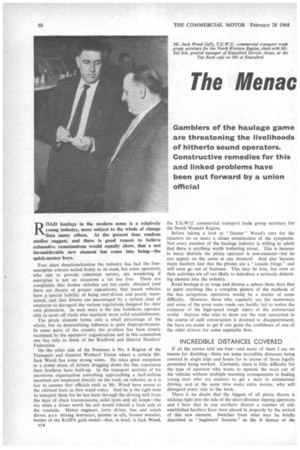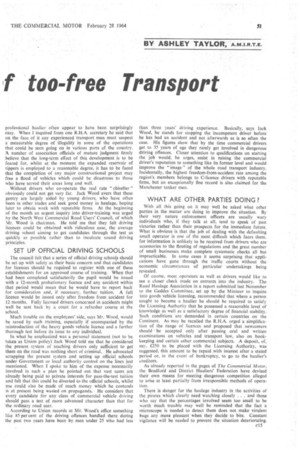The Nlenac
Page 52

Page 53

If you've noticed an error in this article please click here to report it so we can fix it.
BY ASHLEY TAYLOR, A.M.I.R.T.E.
If too-free Transport
ROAD haulage in the modern sense is a relatively young industry, more subject to the winds of change than many others. At the present time random studies suggest, and there is good reason to believe exhaustive examinations would equally show, that a not inconsiderable new element has come into being—the quick-money boys.
Ever since denationalization the industry has had the freeenterprise colours nailed firmly to its mast, but some operators, who aim to provide consistent service, are wondering if enterprise is not on occasions a lot too free. There are complaints that licence switches • are too easily obtained (and there are threats of greater opposition), that leased vehicles have a special liability of being over-driven and poorly maintained, and that drivers are encouraged by a certain class of employer to disregard the various regulations designed for their own protection. In such ways is the less fastidious operator able to score off rivals who maintain more solid establishments.
The pirate element forms only a small percentage of the whole, but its demoralizing influence is quite disproportionate. In some parts of the country the problem has been closely examined by the operators' organizations and in this connection one has only to think of the Bradford and District Hauliers' Federation.
On the other side of the Pennines is No. 6 Region of the Transport and General Workers! Union where a certain Mr. Jack Wood has some strong views. He takes great exception to a lower strata of drivers dragging down the fine reputation their brethren have built-up. In the transport sections of his enormous organization something approaching a half-million members are employed directly on the road, on vehicles, so it is fair to assume that officials such as Mr. Wood have access to the relevant facts as they stand today. And he is the right man to interpret them for he has been through the driving mill from the days of chain transmissions, solid tyres and oil lamps—the era when a driver worth his salt would rebuild a back axle at the roadside. Motor engineer, lorry driver, bus and coach driver, p.s.v, driving instructor, painter in oils, former wrestler,. holder of the RoSPA gold medal—that, in brief, is Jack Wood,
c14 the T.G.W.U. commercial transport trade group secretary for the North Western Region.
Before taking a look at " Doctor " Wood's cure for the situation let us make a closer examination of the symptoms. Not every member of the haulage industry is willing to admit that there is anything worth bothering about. This is because in many districts the pirate operator is non-existent—but he can appear on the scene at any moment. And also because many hauliers feel that the pirates are a "lunatic fringe" and will soon go out of business. This may be true, but even so their activities are all too likely to introduce a seriously disturbing element into the industry.
Road haulage is so large and diverse a sphere these days that to paint anything like a complete picture of the methods of the less scrupulous operators would be a matter of some difficulty, However, those who regularly use the motorways and some of the great main roads can hardly fail to notice the existence of the high-speed rough riders of the commercial world. Anyone who tries to draw out the men concerned in the course of cafe conversation is doomed to disappointment; the facts are easier to get if one gains the confidence of one of the older drivers for some reputable firm.
INCREDIBLE DISTANCES COVERED
If all the stories told are true—and many of them I see no reason for doubting—there are some incredible distances being covered in single trips and hours far in excess of those legally permitted being worked. Currently, there is little difficulty for the type of operator who wants to squeeze the most out of his vehicles without multiple manning arrangements in finding young men who are anxious to get a start in commercial driving, and at the same time make extra money, who will disregard every rule in the book.
There is no doubt that the biggest of all pirate thorns is sticking right into the side of the short-distance tipping operators and I hear that in one northern district a number of oldestablished hauliers have been placed in jeopardy by the arrival of this new element. Switches from what may be briefly described as "beginners' licences" to the A licence of the professional haulier often appear to have been surprisingly easy. When I inquired from one R.H.A. secretary he said that on the face of it any experienced transport man must suspect a measurable degree of illegality in some of the operations that could be seen going on in various parts of the country. A number of association officials of mature judgment firmly believe that the long-term effect of this development is to be feared for, whilst at the moment the expanded reservoir of tippers is employed to a reasonable degree, it has to be faced that the completion of any major constructional project may free a flood of vehicles which could be disastrous to those who have served their areas long and well, Without drivers who co-operate the real rate " chiseller " obviously could not get very far. Jack Wood avers that these gentry are largely aided by young drivers, who have often been in other trades and seek good money in haulage, hoping later to obtain work with reputable firms, At the beginning of the month an urgent inquiry into driver-training was urged by the North West Commercial Road Users' Council, of which Mr. Wood is chairman. He told me that they felt driving licences could be obtained with ridiculous ease, the average driving school aiming to get candidates through the test as quickly as possible rather than to inculcate sound driving principles: SET UP OFFICIAL DRIVING SCHOOLS
The council felt that a series of official driving schools should be set up with safety as their basic concern and that candidates for licences should be required to register with one of these establishments for an approved course of training. When that had been completed satisfactorily the pupil would he issued with a 12-month probationary licence and any accident within that period would mean that he would have to report back for consideration and, if necessary, further tuition. A full licence would be issued only after freedom from accident for 12 months. Fully licensed drivers concerned in accidents might well be sent back by a court for a refresher course at the school.
Much trouble on the employees' side, says Mr. Wood, would be saved by such training, especially if accompanied by the reintroduction of the heavy goods vehicle licence and a further thorough test before its issue to any individual.
in what he emphasized was a personal statement (not to be taken as Union policy) Jack Wood told me that he considered the present system of teaching drivers only sufficient to get them on the road was nothing short of criminal. He advocated scrapping the present system and setting up official schools under Government or local authority control on the lines just mentioned. When I spoke to him of the expense necessarily involved in such a plan he pointed out that vast sums are already being paid to private interests for pass-the-test tuition and felt that this could be diverted to the official schools, whilst use could also be made of much money which he contends is at present being wasted on propaganda. He considers that every candidate for any class of commercial vehicle driving should pass a test of more advanced character than that for the ordinary road user.
According to Union records at Mr. Wood's office something like 85 per cent of the driving offences handled there during the past two years have been by. men under 25 who had less
than three years' driving experience. Basically, says Jack Wood, he stands for stopping the incompetent driver before he has had an accident and not afterwards as is so often the case. His figures show that by the time commercial drivers get to 35 years of age they rarely get involved in dangerous driving offences. Closer attention to qualifications on starting the job would, he urges, assist in raising the commercial driver's reputation to something like its former level and would improve the " image " of the whole road transport industry. Incidentally, the highest freedom-from-accident rate among the region's members belongs to C-licence drivers with reputable firms, but an exceptionally fine record is also claimed for the Manchester tanker men.
WHAT ARE OTHER PARTIES DOING?
With all this going on it may well be asked what other parties in the matter are doing to improve the situation. By their very nature enforcement officers are usually wary individuals who, if they talk at all, tend to speak of past victories rather than their prospects for the immediate future. What is obvious is that the job of dealing with the defaulting small operator is one of the most difficult which faces them, for information is unlikely to be received from drivers who are accessories to the flouting of regulations and the great number of small businesses make complete systematic checks all but impracticable. In some cases it seems surprising that applications have gone through the traffic courts without the economic circumstances of particular undertakings being revealed.
Of course, most operators as well as drivers would like to see a closer check made on entrants into the industry. The Road Haulage Association in a report submitted last November to the Geddes Committee, set up by the Minister to inquire into goods vehicle licensing, recommended that where a person sought to become a haulier he should be required to satisfy the Licensing Authority that he possessed a reasonable level of knowledge as well as a satisfactory degree of financial stability. Such conditions are demanded in certain countries on the Continent. As may be recalled the R.H.A. urged a simplification of the range of licences and proposed that newcomers should be accepted only after passing oral and written examinations on vehicles and transport law, also on bookkeeping and certain other commercial subjects. A deposit, of, say, £250 to be placed with the Licensing Authority, was suggested, this amount to be repaid with interest after a stated period or, in the event of bankruptcy, to go to the haulier's creditors.
As already reported in the pages of The Commercial Motor, the Bradford and District Hauliers' Federation have devised their own means for meeting dangerous competition alleged to arise at least partially from irresponsible methods of operation.
There is danger for the haulage industry in the activities of the pirates which clearly need watching closely . and those who say that the percentages involved seem too small to be worth much trouble may well be reminded that the fact a microscope is needed to detect them does not make virulent bugs any more pleasant when they decide to bite. Constant vigilance will be needed to prevent the situation deteriorating.












































































































